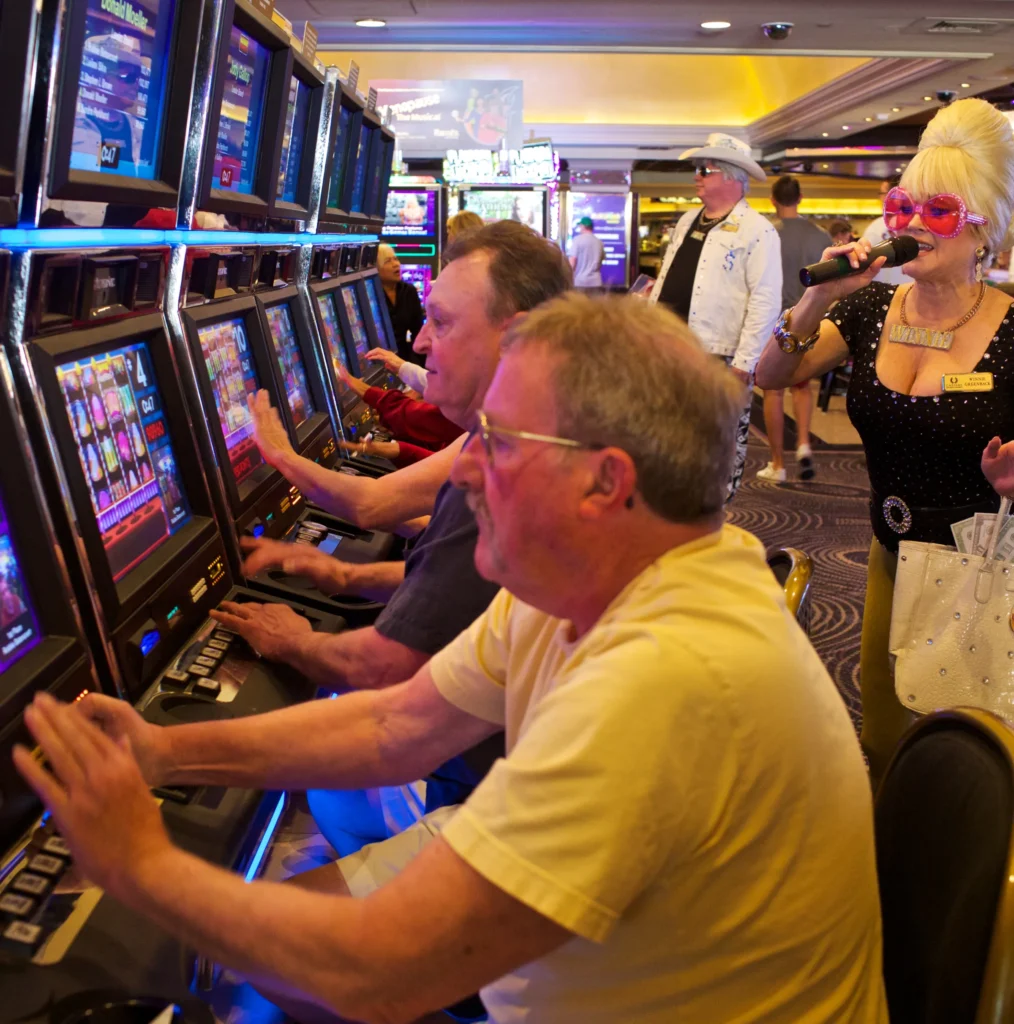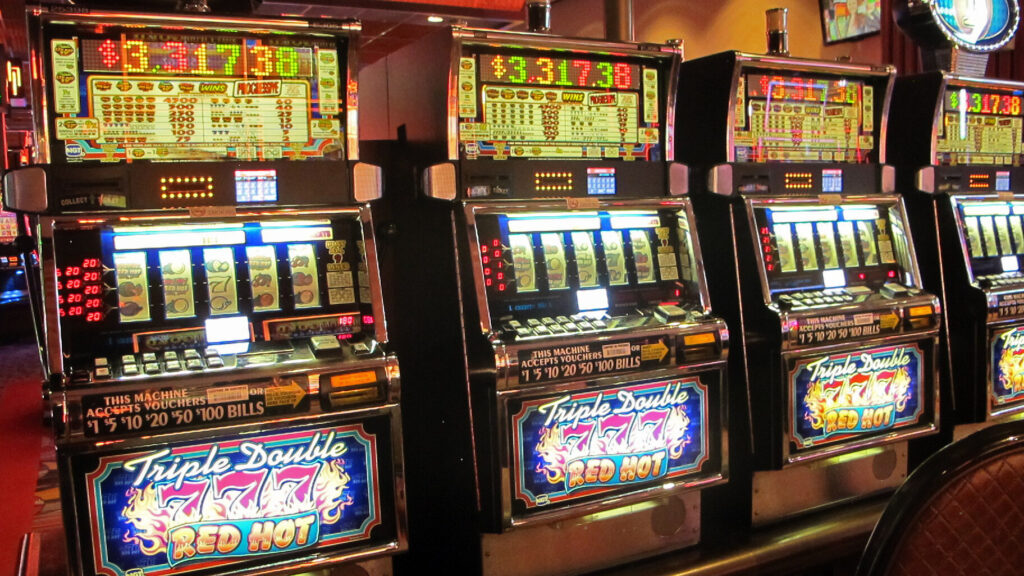Have you ever wondered why that simple machine with spinning reels has captivated millions of people for over a century? Why do people keep pulling that lever or pressing that button, even when they know the odds are against them? The story of slot machines is far more fascinating than you might think – it’s a tale of innovation, psychology, and one of the most successful business models ever created.
The Humble Beginning: When a Car Mechanic Changed Everything
Picture this: It’s 1895 in San Francisco, and a German immigrant named Charles Fey is tinkering in his workshop at 406 Market Street. This car mechanic had no idea he was about to create a global phenomenon that would generate over $70 billion annually in the United States alone.
Fey’s invention? The Liberty Bell – the world’s first true slot machine. Unlike today’s digital marvels, this cast-iron beauty was beautifully simple. It had three metal hoops called reels, each painted with ten symbols: diamonds, spades, hearts, and that iconic cracked Liberty Bell. Hit three Liberty Bells in a row, and you’d win the grand prize of… fifty cents! ThoughtCo
But here’s what makes Fey’s story remarkable: he refused to sell the manufacturing rights to gambling supply companies, despite enormous demand. Instead, he rented his machines to saloons on a 50/50 profit split – essentially inventing the modern casino business model over a century ago!
The Evolution: From Mechanical Marvel to Digital Wizardry
What happened next? The demand was so overwhelming that Herbert Mills, a Chicago manufacturer, created the first “knock-off” in 1907 called the Operator Bell. Mills made a crucial innovation – he added fruit symbols (lemons, plums, cherries) that we still see today.
The real revolution came much later:
- 1964: Nevada Electronic built the first all-electronic gambling machine called “21”
- 1975: Fortune Coin Company created the first electronic slot machine
- 1990s: Video slots transformed the industry
- 2000s: Online slots made gambling available 24/7 from anywhere
Each evolution made these machines more sophisticated, more engaging, and yes – more addictive.
The $70 Billion Question: Why Are People So Hooked?
Here’s where things get really interesting. Modern slot machines aren’t just games – they’re precision-engineered psychological weapons. And I don’t mean that as an exaggeration.
The Dopamine Connection: Your Brain on Slots
Ever wonder why slot machines feel so… compelling? It’s all about dopamine, the brain’s pleasure chemical. But here’s the twist – it’s not the winning that hooks you. It’s the anticipation of winning.
Dr. Luke Clark, a neuroscientist who has extensively studied gambling, discovered something fascinating: slot machines trigger dopamine release even during “near misses” – those moments when you almost win. Your brain literally treats an almost-win as a type of victory, flooding your system with feel-good chemicals even though you just lost money! APA Monitor
The Variable Ratio Reinforcement Schedule: Psychology 101
Remember B.F. Skinner’s experiments with pigeons? Slot machines use the exact same principle that made those birds obsessively peck at buttons. It’s called variable ratio reinforcement – you get rewarded, but you never know when.
Think about it: If you knew exactly which spin would win, you’d only play those spins. If you never won, you’d stop playing immediately. But when wins come randomly and unpredictably? That’s when your brain goes into overdrive, convinced the next spin could be the one.
The Near-Miss Effect: When Losing Feels Like Winning
Here’s a secret most people don’t know: modern slot machines are programmed to show you near-misses more often than pure randomness would dictate. Studies show that these “almost wins” actually increase motivation to keep playing, even though they’re objectively just losses with fancy wrapping.
Research published in Nature found that near-misses activate the same brain regions as actual wins, particularly in the ventral striatum and anterior insula. Your brain literally can’t tell the difference between “almost winning” and “kind of winning.”
The Business Goldmine: Why Casinos Love Slots
Want to know why casino floors are dominated by slot machines? Follow the money.
The Numbers Don’t Lie
- Slot machines generate 80% of casino gambling revenue in most casinos
- The global slot machine market was worth $16.8 billion in 2024 and is expected to reach $28.3 billion by 2034
- In 2023 alone, slot machines brought in $35.51 billion in the United States
- A single slot machine can earn a casino $200-400 per day
The Perfect Profit Machine
Unlike table games that require dealers, slot machines are the ultimate passive income generators. Once installed, they work 24/7 with minimal maintenance, no labor costs, and guaranteed profits thanks to something called the house edge.
Here’s how it works: Every slot machine is programmed with a Return to Player (RTP) percentage, usually between 85-98%. If a machine has a 90% RTP, it means for every $100 put in, it pays out $90 on average. That guaranteed 10% profit margin, multiplied across thousands of machines and millions of spins, creates an absolute goldmine.

Hidden Secrets Most People Never Know
Ready for some insider knowledge that casinos don’t advertise?
Secret #1: The RNG Myth and Reality
Everyone talks about Random Number Generators (RNG), but here’s what they don’t tell you: while the individual symbols are random, the overall payout is rigidly controlled. Modern slot machines use weighted reels – some symbols appear much more often than others, even though each reel position is technically random.
Think of it like this: Imagine a lottery where winning numbers are drawn randomly, but the lottery company puts 1,000 losing balls and only 1 winning ball in the machine. Each draw is “random,” but the outcome is predetermined.
Secret #2: The Placement Psychology
Casinos spend millions studying where to place machines for maximum profit. The loosest machines (with better odds) are often placed:
- Near entrances to attract newcomers
- In high-traffic areas where winners are visible
- Near restaurants and bars where people are relaxed
Meanwhile, the tightest machines are often:
- Near table games (to discourage slot play)
- In isolated corners
- Near the cashier (when you’re cashing out, you’re in a hurry)
Secret #3: The “Hot” and “Cold” Machine Myth
Here’s a truth that might shock you: there’s no such thing as hot or cold machines. Every spin is completely independent. A machine that just paid out a jackpot is just as likely to pay out again immediately as one that hasn’t paid in weeks.
The myth persists because humans are pattern-seeking creatures. We see streaks where none exist and create stories to explain randomness.
Secret #4: The Speed Factor
Modern slot machines are designed for speed. Digital slots can process up to 1,200 spins per hour compared to 300-400 for traditional mechanical slots. Why? Because the faster you play, the more the house edge works against you. Time is literally money – the casino’s money.
The Technology Behind the Magic
Modern Slot Architecture
Today’s slot machines are essentially sophisticated computers running specialized software. Each machine contains:
- A Random Number Generator (RNG) that produces billions of number combinations per second
- A payout table that maps number combinations to specific outcomes
- Sensory enhancement systems (lights, sounds, vibrations) designed to maximize engagement
The Psychology of Design
Everything about a modern slot machine is psychologically engineered:
- Colors: Bright reds and yellows create excitement and urgency
- Sounds: Winning sounds are tuned to specific frequencies that trigger pleasure responses
- Lighting: LED displays create a hypnotic effect that reduces awareness of time and surroundings
- Button placement: Positioned for maximum speed and minimal thought
The Dark Side: When Fun Becomes Addiction
The Vulnerable Populations
Who’s most at risk? Research shows certain groups are particularly vulnerable:
- Young adults (ages 21-24 are the fastest-growing gambling demographic)
- People with low incomes who see gambling as a financial solution
- Individuals with other mental health conditions (96% of problem gamblers have at least one other psychiatric disorder)
- Anyone exposed to gambling at a young age
The Warning Signs
How do you know if slot machine playing has become a problem? Look for these signs:
- Spending more time and money than intended
- Chasing losses with bigger bets
- Lying about gambling activities
- Neglecting work, family, or other responsibilities
- Borrowing money to gamble
The Brain Changes
Long-term gambling actually changes your brain structure. Neuroimaging studies show that problem gamblers have:
- Reduced activity in the prefrontal cortex (decision-making center)
- Altered dopamine receptor density
- Smaller amygdala and hippocampus volumes (affecting emotional regulation and stress management)
The Global Empire: Beyond the Casino Floor
Online Revolution
The internet changed everything. Online slots now account for a huge portion of the global gambling market, with advantages like:
- 24/7 availability
- No travel required
- Lower minimum bets
- Thousands of game varieties
- Bonus features that don’t exist in physical machines
Mobile Gaming Explosion
Smartphone slots have created an entirely new category of gambling. These apps often target younger players through:
- “Social casino” games that start free but encourage real money play
- Integration with video games through “loot boxes”
- Aggressive marketing on social media platforms
The Regulatory Maze
Government Oversight
Slot machine regulation varies dramatically worldwide:
- In Nevada, machines must return at least 75% to players
- In New Jersey, the minimum is 83%
- In Australia, maximum bets are capped to reduce harm
- Many countries have self-exclusion programs allowing people to ban themselves from casinos
Testing and Certification
Every legal slot machine must pass rigorous testing by independent laboratories that verify:
- RNG fairness and randomness
- Advertised payout percentages
- Software security against tampering
- Compliance with local regulations
The Future: What’s Next for Slots?

Virtual and Augmented Reality
VR slots are already emerging, offering immersive experiences that make traditional slots seem primitive. Imagine exploring ancient tombs or outer space while spinning reels – that’s the future casinos are building.
Artificial Intelligence Integration
AI-powered slots will eventually:
- Adapt difficulty based on your playing style
- Personalize bonus features to your preferences
- Optimize sound and visual effects for maximum engagement
- Predict when you’re likely to stop playing and offer incentives to continue
Cryptocurrency and Blockchain
Crypto slots offer new possibilities:
- Provably fair gaming through blockchain verification
- Instant, anonymous transactions
- Global accessibility without traditional banking restrictions
- Smart contracts that automatically execute payouts
The Social Impact: Beyond Individual Addiction
Economic Effects
Slot machines create complex economic impacts:
- Positive: Job creation, tax revenue, tourism
- Negative: Problem gambling costs society an estimated $5-7 billion annually in the US alone
Community Considerations
Questions society must answer:
- Should slot machines be available in airports, gas stations, and grocery stores?
- How do we protect children from gambling-like features in video games?
- What responsibility do casino companies have for problem gambling prevention?
Conclusion: The Double-Edged Sword
So, are slot machines evil? That’s not the right question. They’re tools – incredibly sophisticated, psychologically powerful tools that can provide entertainment for some and create serious problems for others.
The real question is: How do we navigate a world where these machines are becoming more pervasive, more engaging, and more accessible than ever before?
Understanding is power. The more you know about how slot machines work – the psychology, the technology, the business model – the better equipped you are to make informed decisions about your own relationship with gambling.
Whether you’re someone who enjoys the occasional flutter or someone who’s never touched a slot machine, understanding this industry helps us all make better choices in an increasingly gamified world.
Remember: The house always has an edge, but knowledge gives you the power to decide whether to play the game at all.
Want to learn more? The research on gambling psychology and slot machine design is constantly evolving. Organizations like the National Council on Problem Gambling offer resources for anyone concerned about their gambling habits or those of loved ones.
What surprised you most about the world of slot machines? The psychology, the business model, or the technology behind these seemingly simple games? Comment below.






